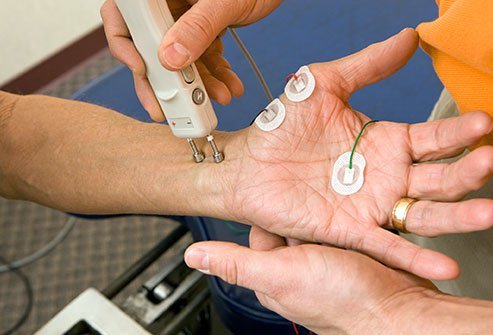What Are the Four Types of Diabetic Neuropathy?

The four types of diabetic neuropathies involve:
- Peripheral distal symmetry polyneuropathy: It is the most common form of neuropathy. It affects the nerves going to the legs, feet, hands, and arms.
- Autonomic neuropathy: It affects the autonomic nerves that control the majority of the body’s function.
- Proximal motor neuropathy: This type of neuropathy causes muscle weakness. It mainly affects the muscles in the upper part of the legs, buttocks, and hips.
- Focal mononeuropathy: In this type of neuropathy, only one specific type of nerves are affected.
What is diabetic neuropathy?
Diabetic neuropathy is a common complication of type 1 and type 2 diabetes. Diabetic neuropathy can be extremely painful. It can also lead to life-threatening health conditions like foot ulcers, amputations, heart attacks, digestion problems, and low blood sugar. Neuropathy mainly occurs due to high blood sugar for a prolonged period.
What are the symptoms of diabetic neuropathy?
The symptoms of diabetic neuropathy differ in different types of neuropathy, which include:
Peripheral neuropathy: Symptoms include:
- Tingling
- Numbness
- Burning especially in the evening
- Pain
Autonomic neuropathy: It affects the digestive system, blood vessels, urinary system, and sex organs. Symptoms of the digestive system include:
If the nerves supplying blood vessels are affected, symptoms are:
- Faster heartbeat
- Blacking out after standing up quickly
- Dizziness
- Low blood pressure
Symptoms when the urinary system is affected:
Symptoms when sex organs are affected:
- Reduced ejaculations
- Vaginal dryness
- Inability to orgasm
Proximal neuropathy: Symptoms include:
Cranial neuropathy: Symptoms include:
- Double vision
- Eye pain
- Paralysis on one side of the face
- Chest or abdomen pain
Who are at risk of diabetic neuropathy?
Factors that may further increase the risk of diabetic neuropathy include:
- Heart disease
- Increased cholesterol level
- Being overweight
- Smoking
- High blood pressure
What are the complications of diabetic neuropathy?
Diabetic neuropathy, if left untreated, can cause the following complications:
- Sores, ulcers, and infection of the foot
- Problems with balance and coordination
- Chronic pain leading to anxiety and depression
- Problems with heart rate
- Carpal tunnel syndrome (numbness and tingling in the hand)
How is diabetic neuropathy treated?
Management of diabetic neuropathy include:
- Control of blood sugar level
- Pain control
- Foot care to prevent complications
To prevent complications of the foot, tips for proper care of feet include:
- Check your feet and legs daily
- Use lotion to smoothen dry feet
- Take proper care of your toenails
- Wear proper-fitting shoes
- Visit your doctor once a year for foot examination
Other preventive measures include:
- Taking smaller meals
- Avoid standing up too quickly
- Wearing special stockings
- Quitting cigarette smoking
Ways to control blood sugar include:
- Regular monitoring of blood sugar level
- Eat a healthy diet
- Exercise can lower the blood glucose level
- Take insulin along with oral medications
Physical therapy, medications, or surgery may also be useful in relieving certain symptoms of diabetic neuropathy.
